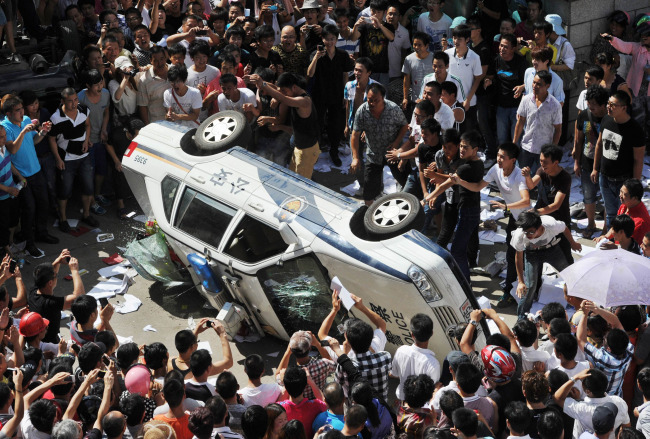QIDONG, China (AP) ― Authorities in eastern China dropped plans for a waste water discharge project Saturday after thousands of protesters angry about pollution took to the streets. It was the latest of many such confrontations in a country where three decades of rapid economic expansion have come at an environmental price.
Some of the protesters in Qidong in Jiangsu province clashed with police and turned a patrol car on its side. After the protest Saturday, the Qidong government announced on its website that plans to build the water discharge project had been scrapped.
 |
Local residents push over a police vehicle as they gather to protest against plans for a water discharge project in Qidong, China Saturday. (AP-Yonhap News) |
The official Xinhua News Agency said thousands of residents took to the streets but dispersed after the government announcement. Later Saturday hundreds of police, some in riot gear, arrived in the coastal town just north of Shanghai and took up positions outside the government offices.
The water discharge project was to be part of a paper-making factory proposed by the Japanese company Oji Paper Group in upstream Nantong city. The government did not say if the plans for the factory have also been permanently dropped.
Oji said in a statement Friday that the waste water would only be discharged after treatment that meets national standards.
“Environmental protection is a high priority for our company,” the statement said.
Chinese have become more outspoken about environmentally risky projects in their backyards, with pollution a leading cause of unrest. Earlier this month, Shifang city in the southwestern province of Sichuan scrapped plans for a copper plant after thousands of protesters, including high school students, clashed with riot police.
The grass-roots protests reflect the balancing act Chinese leaders are performing between maintaining public stability and pushing economic growth, and between local officials who want to attract industry and a public who do not want it in their neighborhoods.
Such protests are especially sensitive ahead of a once-a-decade change in top leaders planned for later this year.








